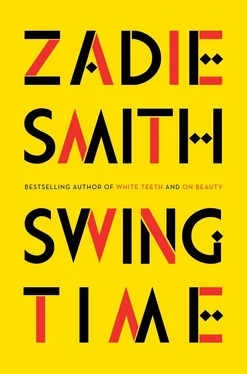Zadie Smith
Swing Time

For my mother, Yvonne
When the music changes, so does the dance.
Hausa proverb
It was the first day of my humiliation. Put on a plane, sent back home, to England, set up with a temporary rental in St. John’s Wood. The flat was on the eighth floor, the windows looked over the cricket ground. It had been chosen, I think, because of the doorman, who blocked all inquiries. I stayed indoors. The phone on the kitchen wall rang and rang, but I was warned not to answer it and to keep my own phone switched off. I watched the cricket being played, a game I don’t understand, it offered no real distraction, but still it was better than looking at the interior of that apartment, a luxury condo, in which everything had been designed to be perfectly neutral, with all significant corners rounded, like an iPhone. When the cricket finished I stared at the sleek coffee machine embedded in the wall, and at two photos of the Buddha — one a brass Buddha, the other wood — and at a photo of an elephant kneeling next to a little Indian boy, who was also kneeling. The rooms were tasteful and gray, linked by a pristine hallway of tan wool cord. I stared at the ridges in the cord.
Two days passed like that. On the third day, the doorman called up and said the lobby was clear. I looked at my phone, it was sitting on the counter in airplane mode. I had been offline for seventy-two hours and can remember feeling that this should be counted among the great examples of personal stoicism and moral endurance of our times. I put on my jacket and went downstairs. In the lobby I met the doorman. He took the opportunity to complain bitterly (“You’ve no idea what it’s been like down here, past few days — Piccadilly-bloody-Circus!”) although it was clear that he was also conflicted, even a little disappointed: it was a shame for him that the fuss had died down — he had felt very important for forty-eight hours. He told me proudly of telling several people to “buck up their ideas,” of letting such and such a person know that if they thought they were getting past him “they had another think coming.” I leaned against his desk and listened to him talk. I had been out of England long enough that many simple colloquial British phrases now sounded exotic to me, almost nonsensical. I asked him if he thought there would be more people that evening and he said he thought not, there hadn’t been anyone since yesterday. I wanted to know if it was safe to have an overnight visitor. “I don’t see any problem,” he said, with a tone that made me feel my question was ridiculous. “There’s always the back door.” He sighed, and at the same moment a woman stopped to ask him if he could receive her dry cleaning as she was going out. She had a rude, impatient manner and rather than look at him as she spoke she stared at a calendar on his desk, a gray block with a digital screen, which informed whoever was standing in front of it exactly what moment they were in to the second. It was the twenty-fifth of the month of October, in the year two thousand and eight, and the time was twelve thirty-six and twenty-three seconds. I turned to leave; the doorman dealt with the woman and hurried out from behind his desk to open the front door for me. He asked me where I was going; I said I didn’t know. I walked out into the city. It was a perfect autumnal London afternoon, chill but bright, under certain trees there was a shedding of golden leaves. I walked past the cricket ground and the mosque, past Madame Tussauds, up Goodge Street and down Tottenham Court Road, through Trafalgar Square, and found myself finally in Embankment, and then crossing the bridge. I thought — as I often think as I cross that bridge — of two young men, students, who were walking over it very late one night when they were mugged and thrown over the railing, into the Thames. One lived and one died. I’ve never understood how the survivor managed it, in the darkness, in the absolute cold, with the terrible shock and his shoes on. Thinking of him, I kept to the right-hand side of the bridge, by the railway line, and avoided looking at the water. When I reached the South Bank the first thing I saw was a poster advertising an afternoon event with an Austrian film director “in conversation,” it was starting in twenty minutes at the Royal Festival Hall. I decided on a whim to try to get a ticket. I walked over and was able to buy a seat in the gods, in the very back row. I didn’t expect much, I only wanted to be distracted from my own problems for a while, to sit in darkness, and hear a discussion of films I’d never seen, but in the middle of the program the director asked his interviewer to roll a clip from the movie Swing Time , a film I know very well, I only watched it over and over as a child. I sat up tall in my seat. On the huge screen before me Fred Astaire danced with three silhouetted figures. They can’t keep up with him, they begin to lose their rhythm. Finally they throw in the towel, making that very American “oh phooey” gesture with their three left hands, and walking off stage. Astaire danced on alone. I understood all three of the shadows were also Fred Astaire. Had I known that, as a child? No one else paws the air like that, no other dancer bends his knees in quite that way. Meanwhile the director spoke of a theory of his, about “pure cinema,” which he began to define as the “interplay of light and dark, expressed as a kind of rhythm, over time,” but I found this line of thought boring and hard to follow. Behind him the same clip, for some reason, played again, and my feet, in sympathy with the music, tapped at the seat in front of me. I felt a wonderful lightness in my body, a ridiculous happiness, it seemed to come from nowhere. I’d lost my job, a certain version of my life, my privacy, yet all these things felt small and petty next to this joyful sense I had watching the dance, and following its precise rhythms in my own body. I felt I was losing track of my physical location, rising above my body, viewing my life from a very distant point, hovering over it. It reminded me of the way people describe hallucinogenic drug experiences. I saw all my years at once, but they were not piled up on each other, experience after experience, building into something of substance — the opposite. A truth was being revealed to me: that I had always tried to attach myself to the light of other people, that I had never had any light of my own. I experienced myself as a kind of shadow.
When the event was over I walked back through the city to the flat, phoned Lamin, who was waiting in a nearby café, and told him the coast was clear. He’d been fired, too, but instead of letting him go home, to Senegal, I’d brought him here, to London. At eleven o’clock he came round, in a hooded top, in case of cameras. The lobby was clear. In his hood he looked even younger and more beautiful, and it seemed to me to be a kind of scandal that I could find in my heart no real feelings for him. Afterward, we lay side by side in bed with our laptops, and to avoid checking my e-mail I googled, at first aimlessly, and then with an aim: I was looking for that clip from Swing Time . I wanted to show it to Lamin, I was curious to know what he thought of it, as a dancer now himself, but he said he had never seen or heard of Astaire, and as the clip played he sat up in bed and frowned. I hardly understood what we were looking at: Fred Astaire in black face. In the Royal Festival Hall I’d sat in the gods, without my glasses on, and the scene opens with Astaire in long shot. But none of this really explained how I’d managed to block the childhood image from my memory: the rolling eyes, the white gloves, the Bojangles grin. I felt very stupid, closed the laptop and went to sleep. The next morning I woke early, leaving Lamin in bed, hurried to the kitchen and switched on my phone. I expected hundreds of messages, thousands. I had maybe thirty. It had been Aimee who once sent me hundreds of messages a day, and now at last I understood that Aimee would never send me another message again. Why it took me so long to understand this obvious thing I don’t know. I scrolled down a depressing list — a distant cousin, a few friends, several journalists. I spotted one titled: WHORE. It had a nonsense address of numbers and letters and a video attachment that wouldn’t open. The body of the message was a single sentence: Now everyone knows who you really are . It was the kind of note you might get from a spiteful seven-year-old girl with a firm idea of justice. And of course that — if you can ignore the passage of time — is exactly what it was.
Читать дальше













